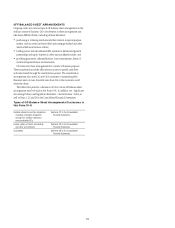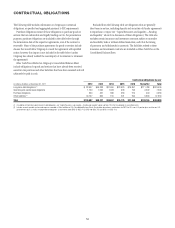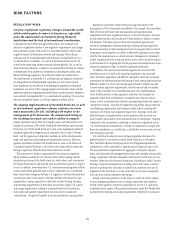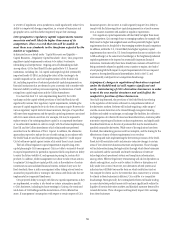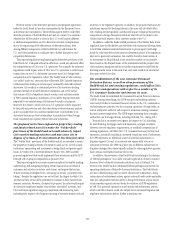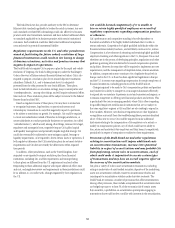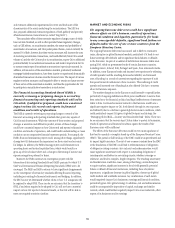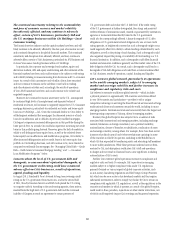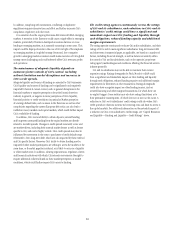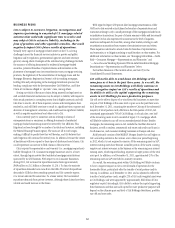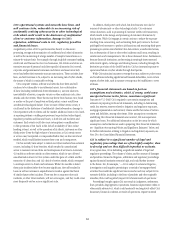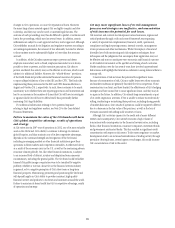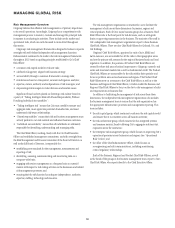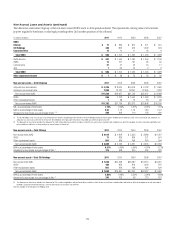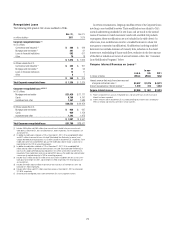Citibank 2011 Annual Report Download - page 85
Download and view the complete annual report
Please find page 85 of the 2011 Citibank annual report below. You can navigate through the pages in the report by either clicking on the pages listed below, or by using the keyword search tool below to find specific information within the annual report.63
Citi’s ability to increase its common stock dividend
or initiate a share repurchase program is subject to
regulatory and government approval.
Since the second quarter of 2011, Citi has paid a quarterly common stock
dividend of $0.01 per share. In addition to Board of Directors’ approval, any
decision by Citi to increase its common stock dividend, including the amount
thereof, or initiate a share repurchase program is subject to regulatory
approval, including the results of the Comprehensive Capital Analysis and
Review (CCAR) process required by the Federal Reserve Board. Restrictions on
Citi’s ability to increase the amounts of its common stock dividend or engage
in share repurchase programs could negatively impact market perceptions of
Citi, including the price of its common stock.
In addition, pursuant to its agreements with certain U.S. government
entities, dated June 9, 2009, executed in connection with Citi’s exchange
offers consummated in July and September 2009, Citi remains subject
to dividend and share repurchase restrictions for as long as the U.S.
government continues to hold any Citi trust preferred securities acquired
in connection with the exchange offers. While these restrictions may be
waived, they generally prohibit Citi from paying regular cash dividends in
excess of $0.01 per share of common stock per quarter or from redeeming
or repurchasing any Citi equity securities, which includes its common stock,
or trust preferred securities. As of December 31, 2011, approximately $3.025
billion of trust preferred securities issued to the FDIC remained outstanding
(of which approximately $800 million is being held for the benefit of the
U.S. Treasury).
Citi may be unable to maintain or reduce its level of
expenses as it expects, and investments in its businesses
may not be productive.
Citi continues to pursue a disciplined expense-management strategy,
including re-engineering, restructuring operations and improving the
efficiency of functions, such as call centers and collections, to achieve a
targeted percentage expense savings annually. However, there is no guarantee
that Citi will be able to maintain or reduce its level of expenses in the
future, particularly as expenses incurred in Citi’s foreign entities are subject
to foreign exchange volatility, and regulatory compliance and legal and
related costs are difficult to predict or control, particularly given the current
regulatory and litigation environment. Moreover, Citi has incurred, and will
likely continue to incur, costs of investing in its businesses. These investments
may not be as productive as Citi expects or at all. Furthermore, as the wind
down of Citi Holdings slows, Citi’s ability to continue to reduce its expenses as
a result of this wind down will also decline.
The value of Citi’s deferred tax assets (DTAs) could be reduced
if corporate tax rates in the U.S. or certain state or foreign
jurisdictions are decreased or as a result of other potential
significant changes in the U.S. corporate tax system.
There have been discussions in Congress and by the Obama Administration
regarding potentially decreasing the U.S. corporate tax rate. Similar
discussions have taken place in certain state and foreign jurisdictions. While
Citi may benefit in some respects from any decreases in these corporate tax
rates, any reduction in the U.S., state or foreign corporate tax rates would
result in a decrease to the value of Citi’s DTAs, which could be significant.
There have also been recent discussions of more sweeping changes to the
U.S. tax system, including changes to the tax treatment of foreign business
income. It is uncertain whether or when any such tax reform proposals will
be enacted into law, and whether or how they will affect Citi’s ability to make
effective use of its DTAs.
The expiration of a provision of the U.S. tax law that
allows Citi to defer U.S. taxes on certain active financing
income could significantly increase Citi’s tax expense.
Citi’s tax provision has historically been reduced because active financing
income earned and indefinitely reinvested outside the U.S. is taxed at the
lower local tax rate rather than at the higher U.S. tax rate. Such reduction
has been dependent upon a provision of the U.S. tax law that defers the
imposition of U.S. taxes on certain active financing income until that income
is repatriated to the U.S. as a dividend. This “active financing exception”
expired on December 31, 2011 with respect to taxable years beginning after
such date. While the exception has been scheduled to expire on numerous
prior occasions, Congress has extended it each time, including retroactively
to the start of the tax year. Congress could still take action to retroactively
extend the active financing exception to the beginning of 2012. However,
there can be no assurance that it will do so. If the exception is not extended,
the U.S. tax imposed on Citi’s active financing income earned outside
the U.S. would increase, which could further result in Citi’s tax expense
increasing significantly, particularly beginning in 2013.


